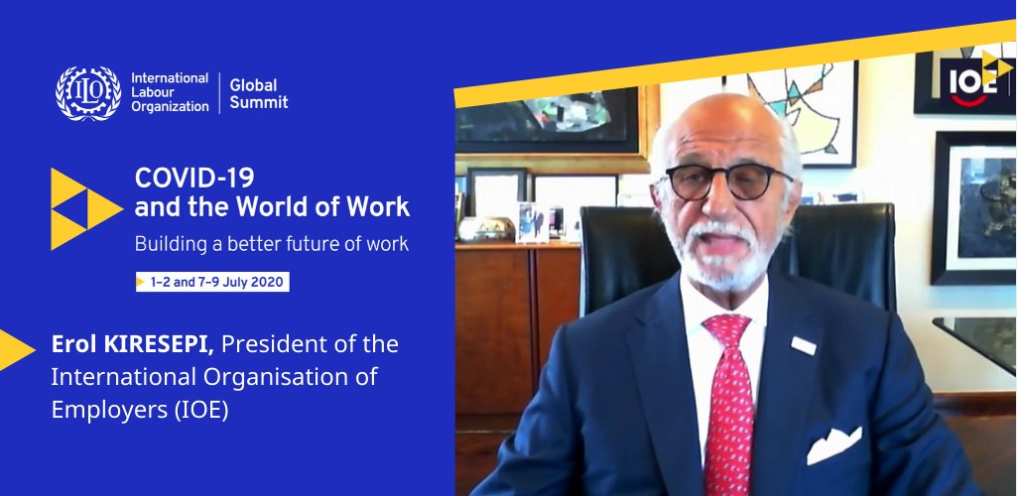- News
- Overcoming the Pandemic Can Be Possible Only When Developing Fast, Sustainable And Inclusive Policies Under Private Sector Leadership
Overcoming the Pandemic Can Be Possible Only When Developing Fast, Sustainable And Inclusive Policies Under Private Sector Leadership
Mr. Erol Kiresepi, President of the International Organization of Employers (IOE) and Chairman of the Board of Santa Farma Pharmaceuticals:
“Overcoming the Pandemic Can Be Possible Only When Developing Fast, Sustainable And Inclusive Policies Under Private Sector Leadership”

Mr. Erol Kiresepi, President of the International Organization of Employers (IOE) and the Chairman of the Board of Santa Farma Pharmaceuticals, delivered a speech representing world employers at the COVID-19 and Global Business Life Summit, held live on 8 July 2020, by the International Labor Organization (ILO), where leaders from 60 countries participated as speakers.
Mr. Kiresepi emphasized that the gigantic crisis experienced negatively affects the lives and lifestyle of all of us, and deeply undermines the development goals of the countries, and that there were significant income losses and unemployment increases due to the pandemic in terms of working life. As the President of IOE, e.g. the largest representative of the private sector in the world, he underlined that he witnessed the great efforts made by various stakeholders to overcome the crisis and that these international efforts are urgently needed to be coordinated within the framework of cooperation and joint action
“The private sector plays a vital role”
Mr. Kiresepi pointed out that getting out of the crisis is only possible if rapid, sustainable and inclusive policies are developed under the leadership of the private sector, and that there is a greater need for improvement of the investment environment than ever before, which will prepare the ground for the development and strengthening of private sector enterprises.
Stating that the unemployment and income losses caused by the crisis can be eliminated by creating new job opportunities and employment areas, the IOE President emphasized that priority should be given to revitalizing trade, industry and investment areas, and to support business continuity and the real economy on a global scale.
Pointing out that the pandemic created awareness in the business world such as innovation, changing business models and making use of technology correctly, Mr. Kiresepi said, “The crisis has brought positive developments in terms of sustainability and business continuity. As a result, we must always consider the need to invest in skills development and lifelong learning solutions to ensure employability of employees when building a better future. Creating a better future for the working life after the crisis will also enable the supply of skills to meet the needs of the labor market. ”
Emphasizing that the ILO plays an important role in this regard, Mr. Kiresepi said, “The ILO should support the workers, employers and government sections in its fields by managing the crisis and getting out of the crisis in a sustainable manner.” spoke in the form.
“There is an urgent need for public interventions”
Emphasizing that all parties need cooperation in terms of getting out of the crisis, Mr. Kiresepi said: “It is not possible for companies to survive the crisis on their own, and stable cooperation between the public and private sectors is now more important than ever. There is also an urgent need for public interventions for new and innovative approaches for a speedy recovery process. In addition, it is necessary to strengthen effective social dialogue with determination. Social dialogue is the key factor for the establishment of agreed and effective strategies for returning to a safe and successful working life. Employers and workers' organizations also play an important role in providing guidance for this purpose and creating a timely, reliable information flow. ”
Mr. Kiresepi also underlined that a new understanding of social protection should be developed especially within the scope of the pandemic. Regarding the subject, he said, “While talking about a safe return to life in the context of an emergency, we need to intensify our efforts towards developing social protection systems and making them sustainable and compatible with the environment. However, the process of the formation of national Social Protection Systems needs to go hand in hand with policies regarding the demanding situation of a large number of employees within the informal economy. The Covid-19 crisis increases its effects on workers in the informal economy worldwide, especially in developing countries, where they represent 70 percent of the workforce. The pandemic process has clearly revealed the weaknesses of the informal economy. The reduction of the sensitivity and exposure to risks of the workers in the informal economy can only be possible with sound and effective policies that facilitate the transition to the formal economy."